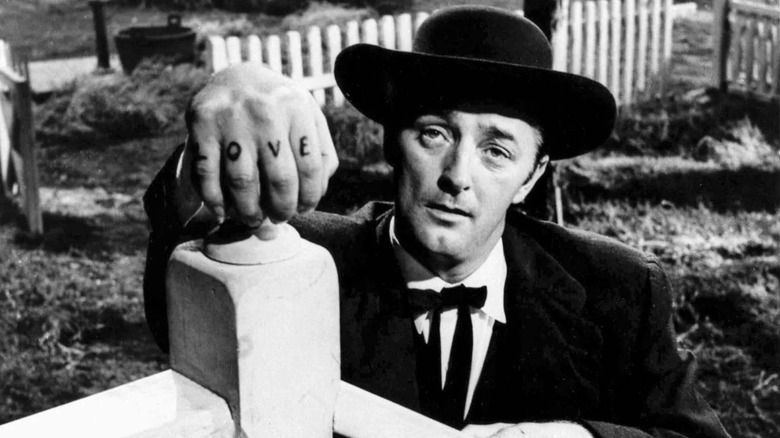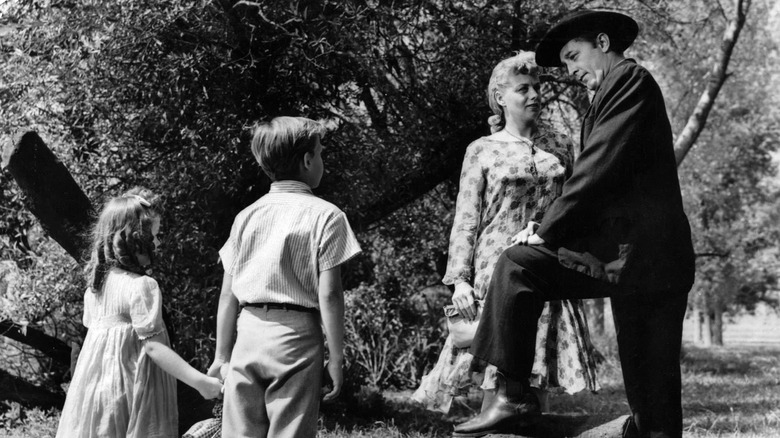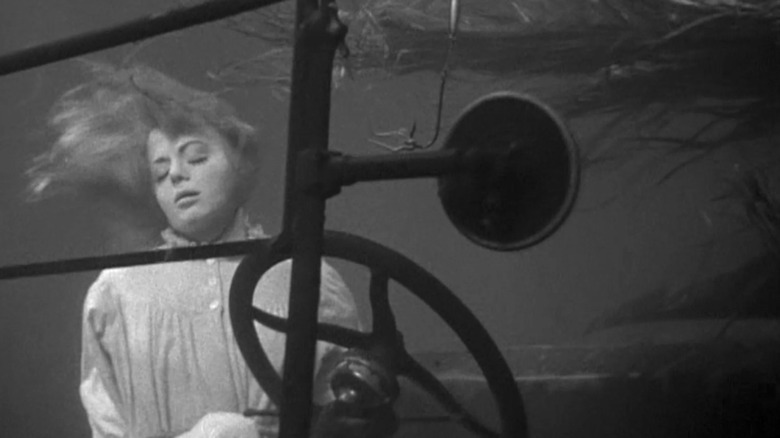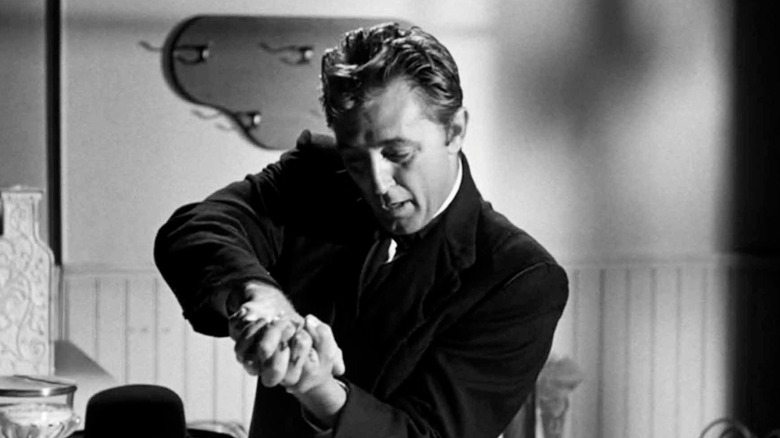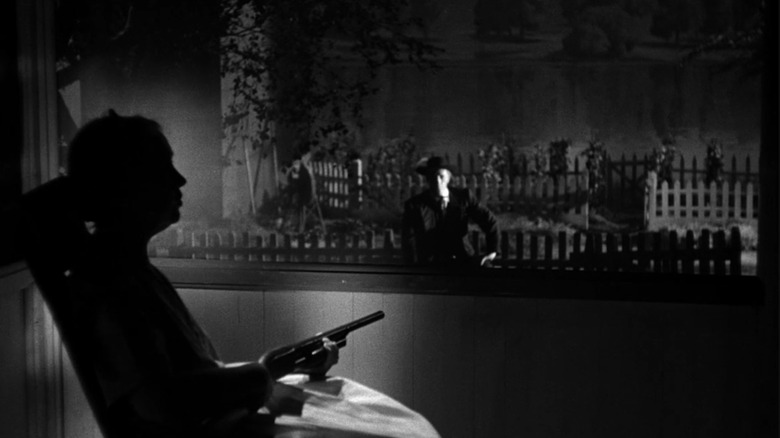The Night Of The Hunter Ending Explained: The Age-Old Battle Between Love And Hate
When it comes to movies by one-and-done directors, there is no greater achievement than Charles Laughton's "The Night of the Hunter," one of the most singular American films ever made. Nowadays, we'd probably pitch it as somewhere between a pastoral fable and a proto-slasher, but when it was released in 1955 it was a vision so unique that neither critics nor audiences knew what to make of it. It became such a monstrous flop that Laughton never directed another film.
Thankfully, time has been extremely kind to "The Night of the Hunter," and Laughton's neglected masterpiece is now receiving the recognition it deserves. In this year's Sight and Sound Top 100 list of the greatest films of all time, it vaulted 38 places from 63rd in the 2012 edition to joint 25th alongside "Au Hasard Balthazar." It didn't even make the list in the previous decade's poll, so at this rate of critical reappraisal, it will soon be challenging "Citizen Kane" and "Vertigo," those two evergreen mainstays in the top spots.
Why does "The Night of the Hunter" strike such a chord with a modern audience? Perhaps because it's a film that stands almost outside of time. While Orson Welles' and Alfred Hitchcock's masterpieces were innovative and pioneering, they were still very much a product of their respective decades. "The Night of the Hunter," on the other hand, may be set in the Depression Era and made in the mid-'50s but Laughton's allegorical approach gives it the timelessness of a fairytale, hovering in an intoxicating twilight zone between rural dream and noirish nightmare. At its core, however, it is a classic tale of good versus evil; let's take a closer look at how that battle plays out.
So what happens in The Night of the Hunter again?
Harry Powell (Robert Mitchum) is a murderer posing as a hellfire preacher, preying on lonely widows for their savings. On one of his stops, he is arrested for stealing a car and thrown in jail for 30 days.
Meanwhile, Ben Harper (Peter Graves) is on the run from the law. He's just robbed a bank for $10,000 and killed two people in the process. With the cops closing in, he heads back home where he finds the perfect place to stash the cash; inside his daughter Pearl's (Sally Jane Bruce) favorite doll. Knowing the game is up, Ben tells his son John (Billy Chaplin) to look after his little sister and makes both children swear they will never tell where the money is hidden.
Ben Harper is sentenced to death and shares a cell with Reverend Harry Powell as he awaits his execution. The Preacher tries to pry the location of the loot from him, but Harper is no fool and takes his secret to the gallows.
Once Powell is released, he heads for Ben Harper's hometown where he sweet-talks the locals and woos the dead man's widow, Willa (Shelley Winters), who he soon marries. John is the only person who can see through Powell's charade and looks on in horror as Powell constantly works on Pearl to find out where the money is.
When Willa overhears Powell threatening the little girl, he murders his new wife in the night and dumps her body in the river. Alone with the children now, he soon discovers that the money is inside Pearl's doll, but the kids escape by boat downstream. With Powell in pursuit, they find refuge with the stern but kindly Rachel Cooper (Lillian Gish), an elderly woman who takes care of orphans.
The Night of the Hunter is a dark fairytale packed with allusions
For "The Night of the Hunter," Charles Laughton wanted to hark back to more time-honored methods of storytelling, including fairytales, biblical tales, and silent cinema, and the film is packed with allusions. The film is based on David Grubb's novel of the same name, which was inspired by a real-life crime case that had a folkloric aspect to it. Harry Powers, one of America's first known serial killers, lured rich widows with lonely heart ads before disposing of them and their children in a specially constructed dungeon beneath his garage. His chilling crimes earned him the nickname "the West Virginia Bluebeard" after the old tale of the nobleman who murders his six wives and keeps their bodies locked in a forbidden chamber. Towards the end of the film, the angry mob refers to Powell as Bluebeard, completing the allusion.
Powell's relentless pursuit of the children recalls the big bad wolf and the little pigs while Pearl and John's river journey echoes that of baby Moses, something not lost on their savior, who is a devout Christian. Rachel Cooper is presented as a Mother Goose figure, busying along with her gaggle of lost children behind her. Superstition and counter-magic also play a part when Powell breaks into the house to get at the children and he is undone when the house cat scratches him. Ancient Egyptians believed that cats could ward off malevolent spirits, while in Europe dead kitties were often placed in the walls of homes to protect against evil (via Cassidy Cash). Does Rachel Cooper's cat follow suit and protect her and the kids?
Love vs Hate
Harry Powell is one of cinema's most memorable villains, a luxuriantly wicked study of evil from Hollywood bad boy Robert Mitchum. The actor had many great roles in a career spanning over 100 movies, but Powell is probably the one he is remembered for most. A Hollywood producer once described him as looking like "a shark with a broken nose," which is fitting for Powell, too. While he is ruthlessly single-minded when he smells blood, he is frequently prone to slapstick pratfalls that puncture the horror.
Most famously, Powell has "LOVE" and "HATE" tattooed across his knuckles, which he uses to give a simplistic sermon on the age-old battle between good and evil. By a quirk of voting fate, "The Night of the Hunter" was pipped to the 24th spot in the Sight and Sound poll by "Do the Right Thing;" Spike Lee has cited Laughton's film as one of his favorites (via Far Out) and he paid homage to Powell's speech in his sizzling masterpiece when Radio Raheem (Bill Nunn) gives his version of the tale with his gold knuckledusters.
Powell's story of good versus evil is the main theme of the film, closely followed by the innocence and resilience of the children who are let down by the adults in their lives. Ben Harper's foolhardy crime leaves them without a father and Willa is too weak-willed to protect them against Powell; the townsfolk are easily hoodwinked by his snake oil, and kindly old Uncle Birdie (James Gleason) passes out drunk when they need him most.
For much of the film hate, personified by Powell, seems to have love on the ropes. That finally changes when John and Pearl wash up with Rachel Cooper, a force of pure good that even the diabolical preacher cannot overcome.
Lillian Gish was cast to represent the silent era
To make his connection to the silent era, Charles Laughton cast one of the greatest actors of early cinema in the role of Rachel Cooper. Lillian Gish made dozens of films in the '10s and '20s, most notably as a leading lady for D.W. Griffith in works like "The Birth of a Nation" and "Intolerance." When she asked Laughton why he had cast her, the director said (via Deep Focus Review):
"When I first went to the movies, they sat in their seats straight and leaned forward. Now they slump down, with their heads back, and eat candy and popcorn. I want them to sit up straight again."
Gish was in her 60s when she played the role and she is a beautiful and compassionate counterpoint to Mitchum's menacing dark cloud. Rachel Cooper has Powell's number from the moment she lays eyes on him; forthright and fiercely individual, her faith is uncorrupted by the busy-body gossip and hypocrisy of the others. If the preacher and the God-fearing people he repeatedly suckers represent the worst of small-minded communal piety, Mrs. Cooper is a reminder that religion can also be an empowering and positive force.
The showdown between love and hate comes in the wonderful scene when Powell sits outside the house at night, waiting for his moment to sneak in and get the children. Rachel Cooper stays awake, on guard with her shotgun. Powell sings his usual refrain of "Leaning on the Everlasting Arms" and the old woman, refusing to be intimidated, joins in with her own version. It marks the turning point when good battles back against evil. Just as Powell's sermon goes, the unconditional love of Rachel Cooper wins out over the preacher's bottomless depths of hatred.
